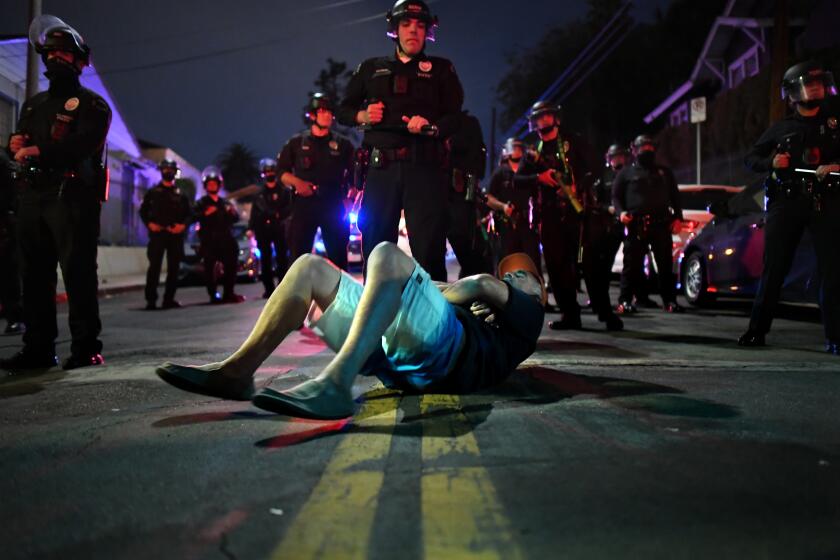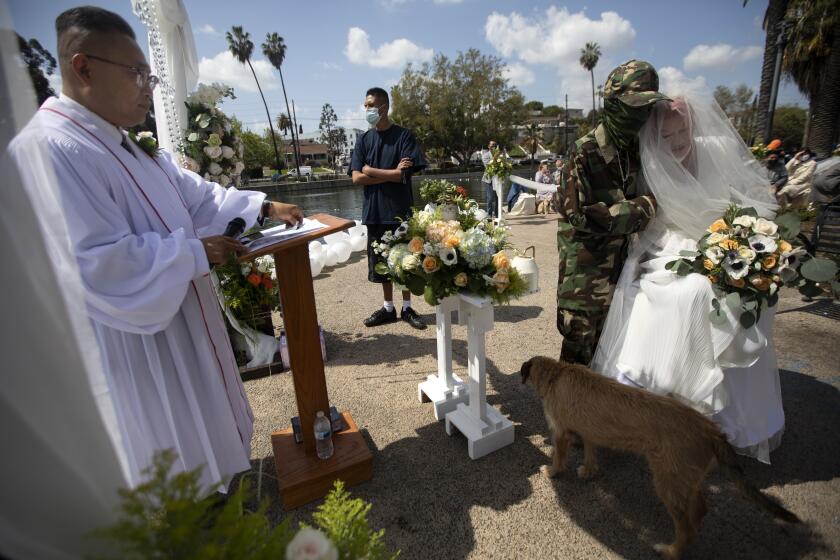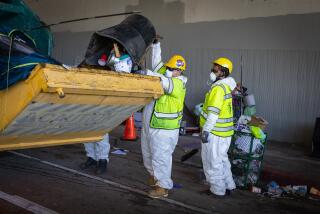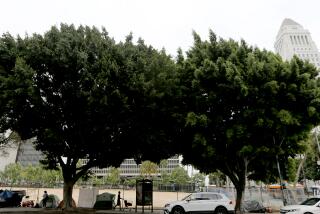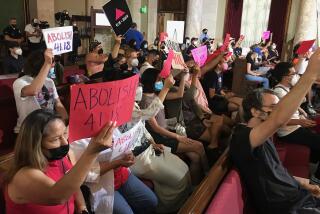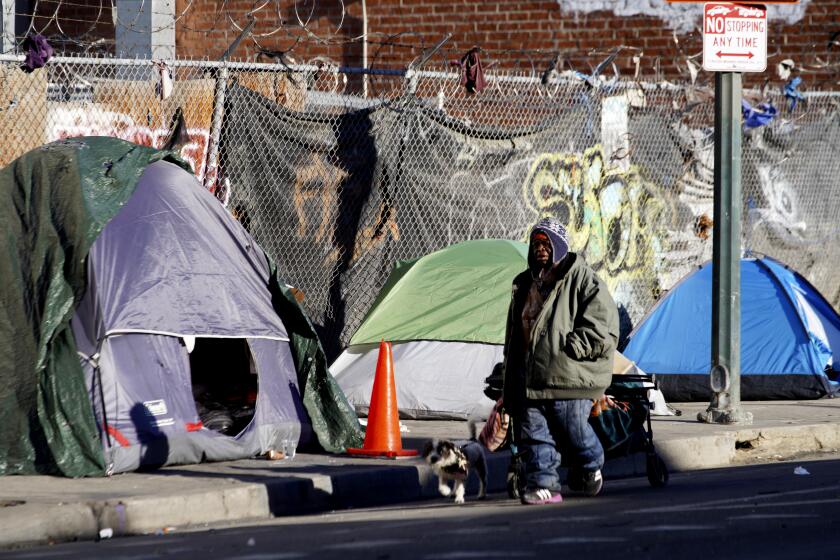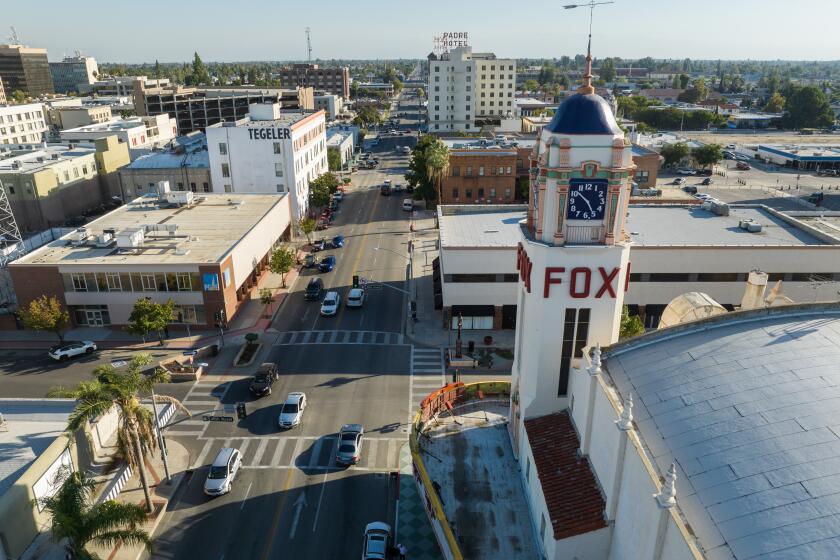The Echo Park homeless camp is gone. What does it mean for L.A.?
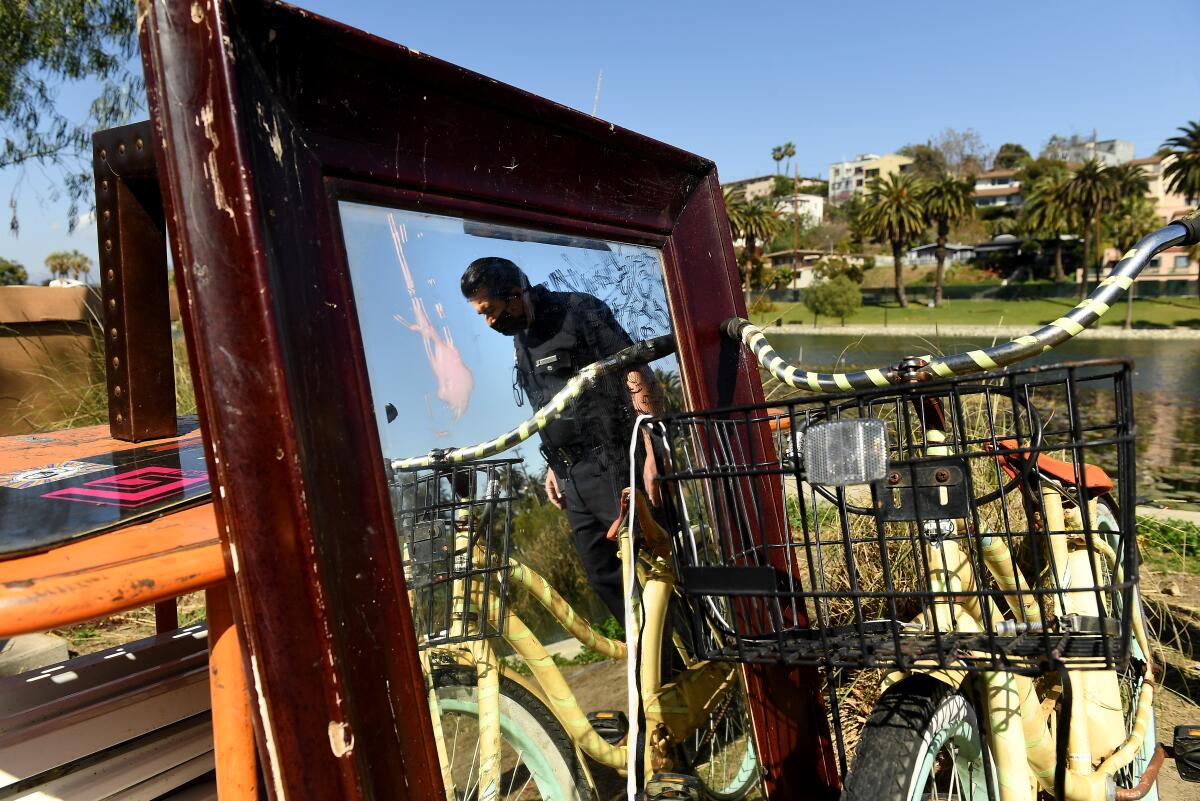
When the city swiftly fenced off Echo Park and prodded people out of a sprawling camp that had taken root along its scenic lake, it was an extraordinary move in a city full of homeless encampments.
Nighttime crews hustled to erect a metal fence wrapped in green fabric around the park. Police descended and ejected irate protesters. Outreach workers were sent out to offer hotel rooms and other shelter to homeless people before a looming deadline to vacate the soon-to-be-shuttered park.
Even some of the dwindling numbers of people who lingered in the encampment this week were taken aback by the singular effort focused on Echo Park, as hundreds of homeless camps remain in other neighborhoods and parks. If the city claimed to be helping people, asked Isabel Castro, why were they zeroing in so intently on this one encampment?
“Go take a walk at MacArthur Park,” Castro urged this week outside her tent. “See if you truly care for the people.”
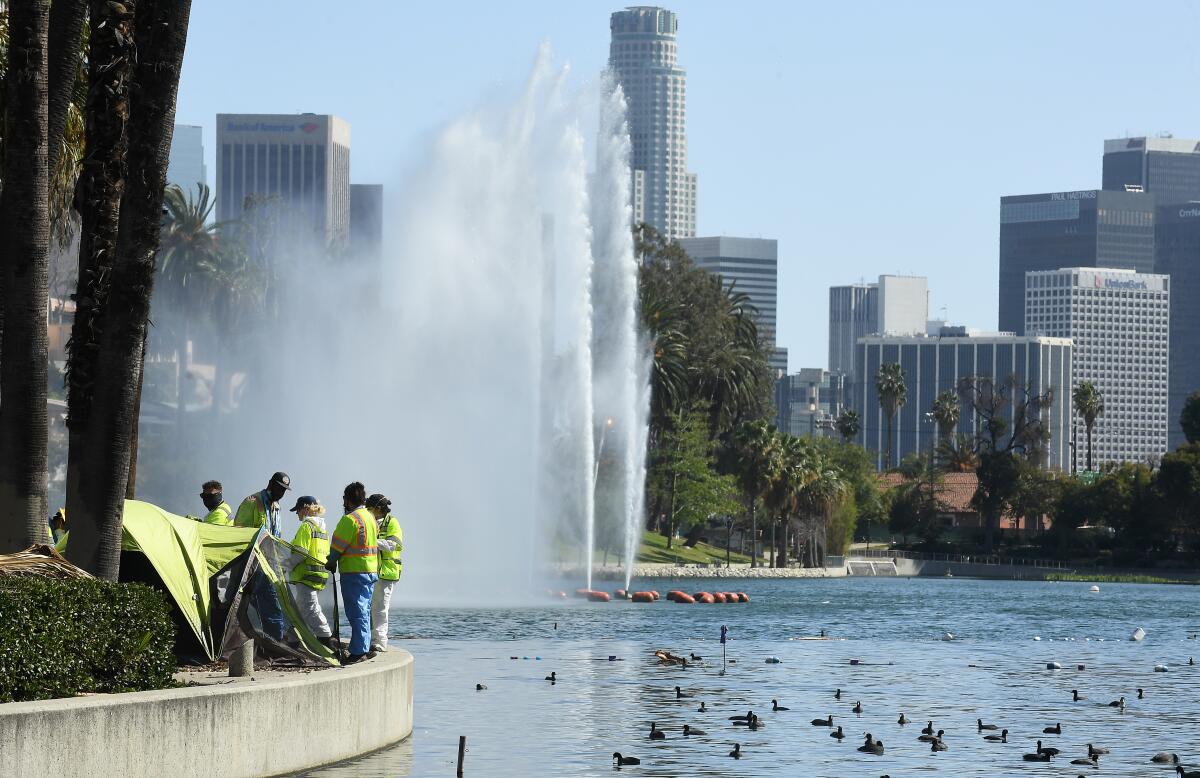
Uprooting the Echo Park camp drew protests, condemnation from the American Civil Liberties Union and even criticism from some within City Hall. On Thursday night, police arrested 182 protesters and briefly detained journalists, including an L.A. Times reporter.
But in some corners of the city, residents were envious, wanting to know why the same moves had not been made in their neighborhoods. Progressive activists, in turn, fear the aggressive tack at Echo Park could become a playbook.
LAPD and protesters square off in Echo Park as an imminent city closure draws near.
At a press conference Friday, Mayor Eric Garcetti framed the effort as a success, calling it “the largest housing transition of an encampment ever in the city’s history.” He suggested that in some cases, it could be replicated.
“Nobody dreamed that we’d be able to house more than 200 people when they started,” the mayor said.
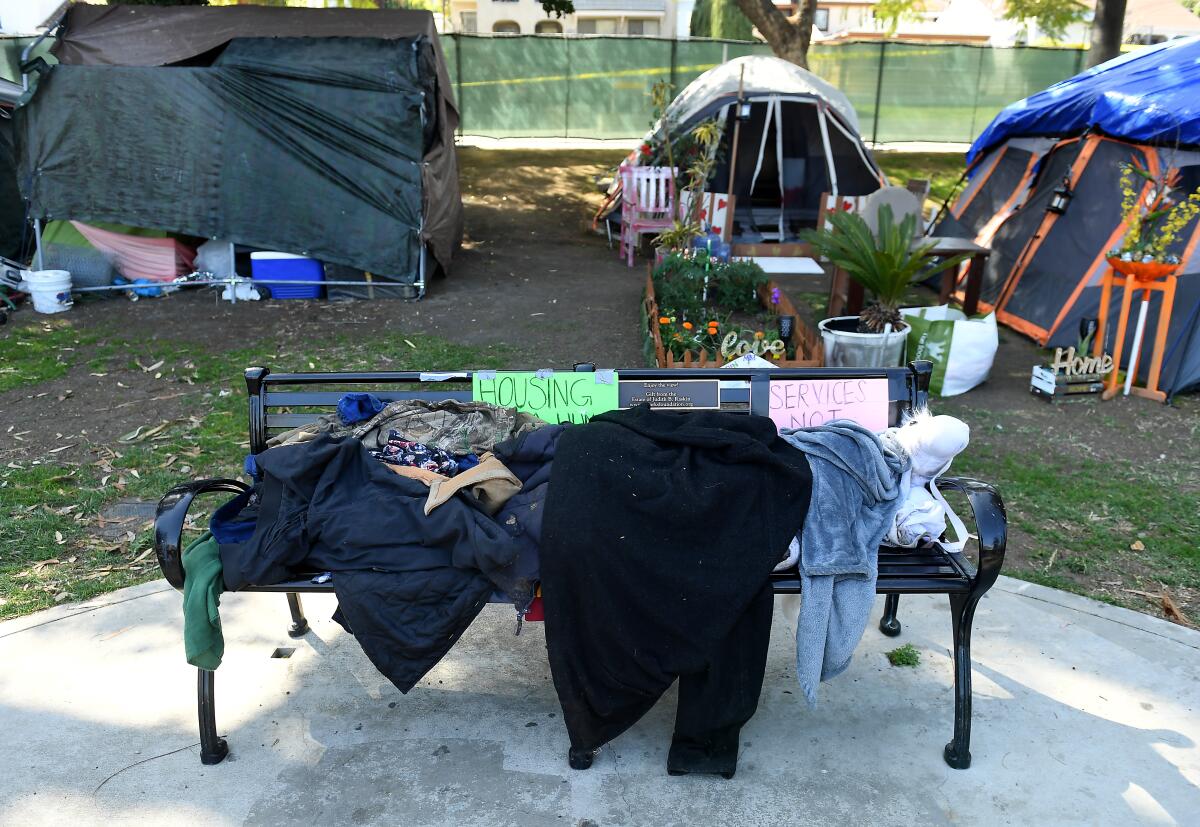
Councilman Joe Buscaino, who represents a district that stretches from Watts to San Pedro, also praised the Echo Park effort, saying in a written statement that the “approach of intensive outreach followed by a ‘choice date’ must become the standard if we are going to move people living on our streets into a better situation.”
“We no longer have the luxury to wait until people are ready,” Buscaino said.
In Venice, Brian Averill and his newly formed group are pushing Councilman Mike Bonin to undertake a similar effort to remove a beachfront encampment that has grown to more than 200 tents. “Venice is a powder keg right now,” Averill said. “We need to see the city take some step to show they’re serious right now. We haven’t seen it.”
The Venice Boardwalk Action Committee is proposing a four-week program to conduct extensive outreach involving L.A. city sanitation, county mental health and the Los Angeles Police Department to find housing for 250 people and then keep the beach free of tents. Averill said the Echo Park closure could be a model, but said he hoped that “we learn from the mistakes Councilman (Mitch) O’Farrell made over there with the police presence.”
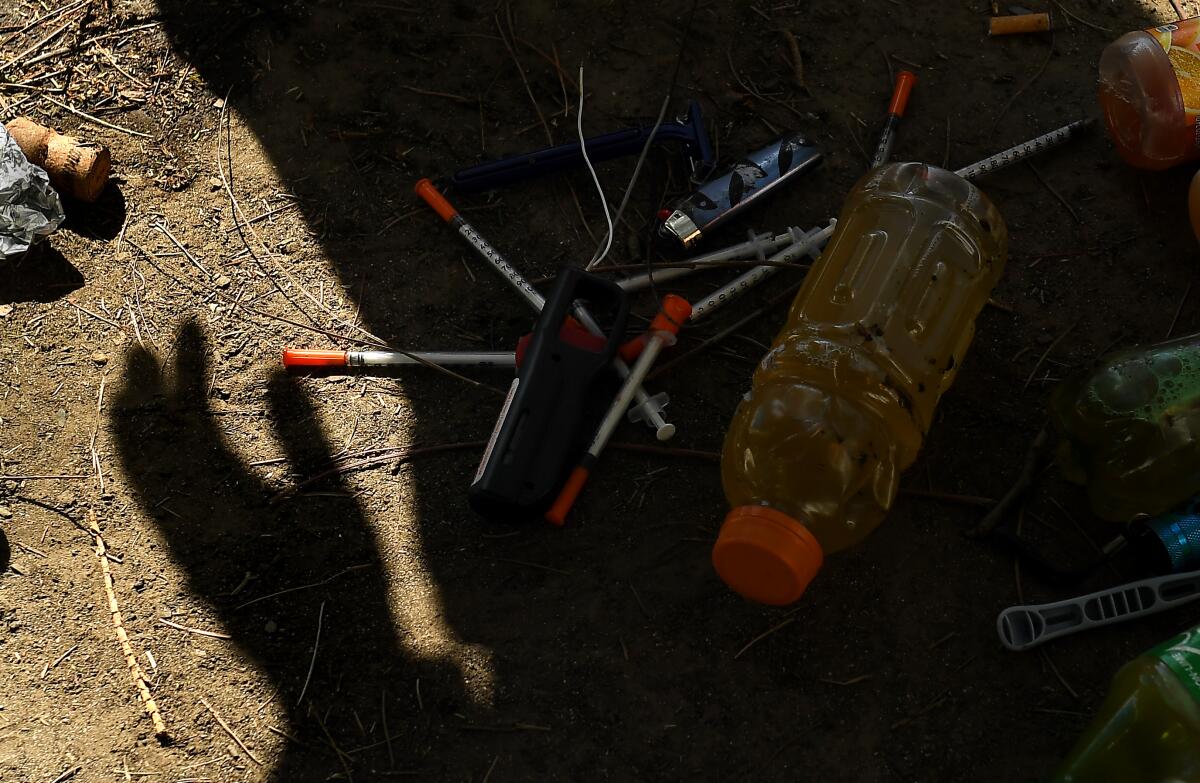
Venice resident Brian Lindner, who goes to its boardwalk regularly to cycle and swim, said he got involved in such efforts after his daughter was approached by a drunken homeless person. The Echo Park closure gave him some hope, he said, although he wondered if it would also push more homeless people toward Venice.
For the Venice Beach boardwalk, “can something like that happen, to get that back into useful condition?” he asked.
Echo Park Lake is hardly the first place where L.A. has sought to clear a homeless encampment, but it became a flashpoint for many reasons. Homeless activists defined the camp as a community and mobilized others — including Echo Park residents who aren’t homeless — to rally to their cause. Angelenos troubled by the encampment, in turn, were emotionally invested in a beloved park that had undergone tens of millions of dollars in renovations years earlier.
“I’m not sure how many privileged residents on Nextdoor badly want to reclaim an alley in South L.A.,” said Bill Przylucki, executive director of the progressive group Ground Game LA. “Caving to that pressure is part of how we got to the response we saw.”
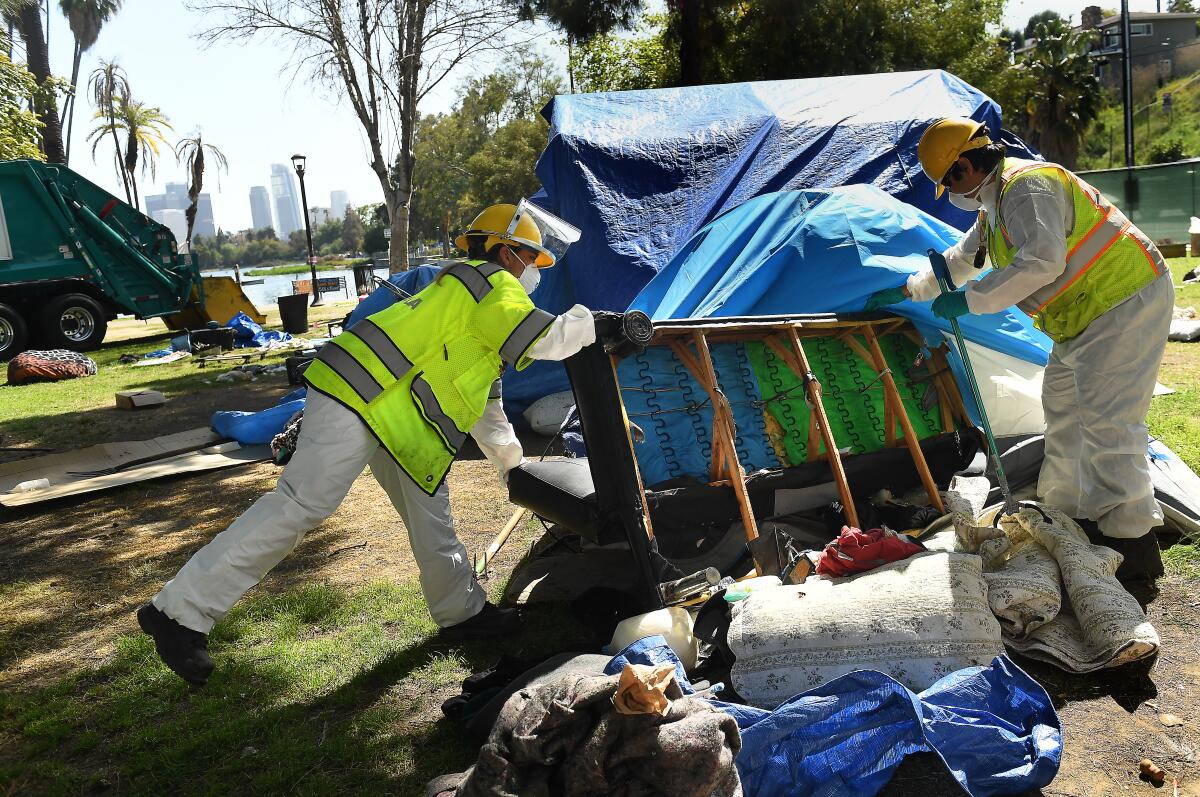
Another factor is who leads the council district: O’Farrell, who represents the area, drove the decision to temporarily close the park, arguing that it had become a chaotic and dangerous place where assaults and other criminal activity flourished. The closure would allow for repairs, he said.
“This situation was never intended to last indefinitely,” he said of the park encampment. With hotel rooms and shelter beds being offered, he said, “it is long past time to move on. And that is exactly what we are doing.”
Others on the council have criticized the move. “The sudden closure of the park, the massive LAPD presence, the use of force against protesters, the enclosure of unhoused people who were in the process of placement into hotel shelters ... none of it needed to happen,” said Councilwoman Nithya Raman, who visited Echo Park amid the furor.
Meanwhile, some residents in her district said they were frustrated that Raman had not taken similar action to eliminate an encampment along Berendo Street in Hollywood, which has spurred complaints about illegal activity.
“She has time to show up for a photo op in Echo Park, but she cannot come down and meet with the neighbors who have been asking for months to meet her face to face,” said Charlie Collins, who said he is part of a committee concerned about encampments in Los Feliz and Hollywood.
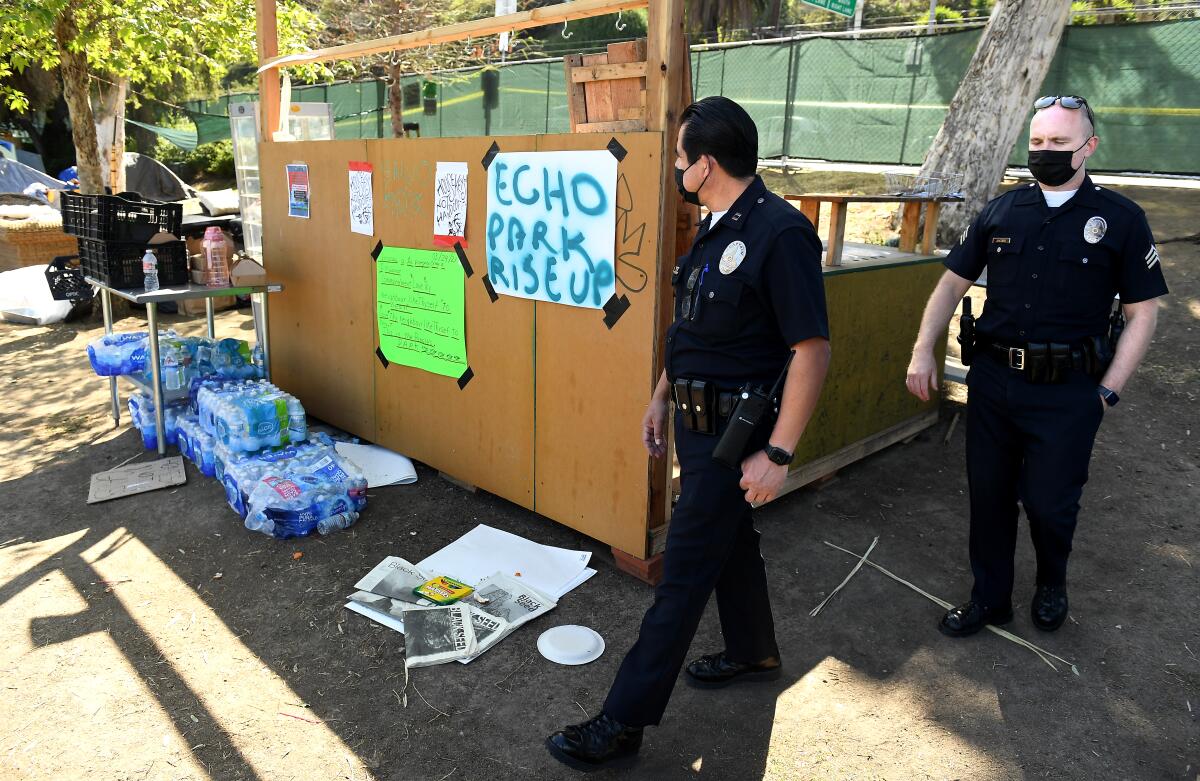
A Raman spokesman said her staff have met regularly with Berendo residents and that the councilwoman had visited the encampment and agreed to a Zoom meeting with neighbors.
In Boyle Heights, Veta Gashgai said she would welcome the city doing in Hollenbeck Park what it had done in Echo Park. A homeless camp has persisted there for years and disabled the park restrooms, Gashgai said.
“We want help for them, but they can’t just be taking over the park,” said Gashgai, who works with a group called Organized Blocks of Boyle Heights. She argued that the residents should all be offered housing and that if “they choose not to go, they should be forced out.”
Some homeless people elsewhere in the city said that they envied the way protesters had rallied behind the Echo Park Lake encampment. “When they kicked us out, there weren’t a lot of people here,” said Tammy Vindiola, who said she had been ejected from a street in South Los Angeles. “There were the police.”
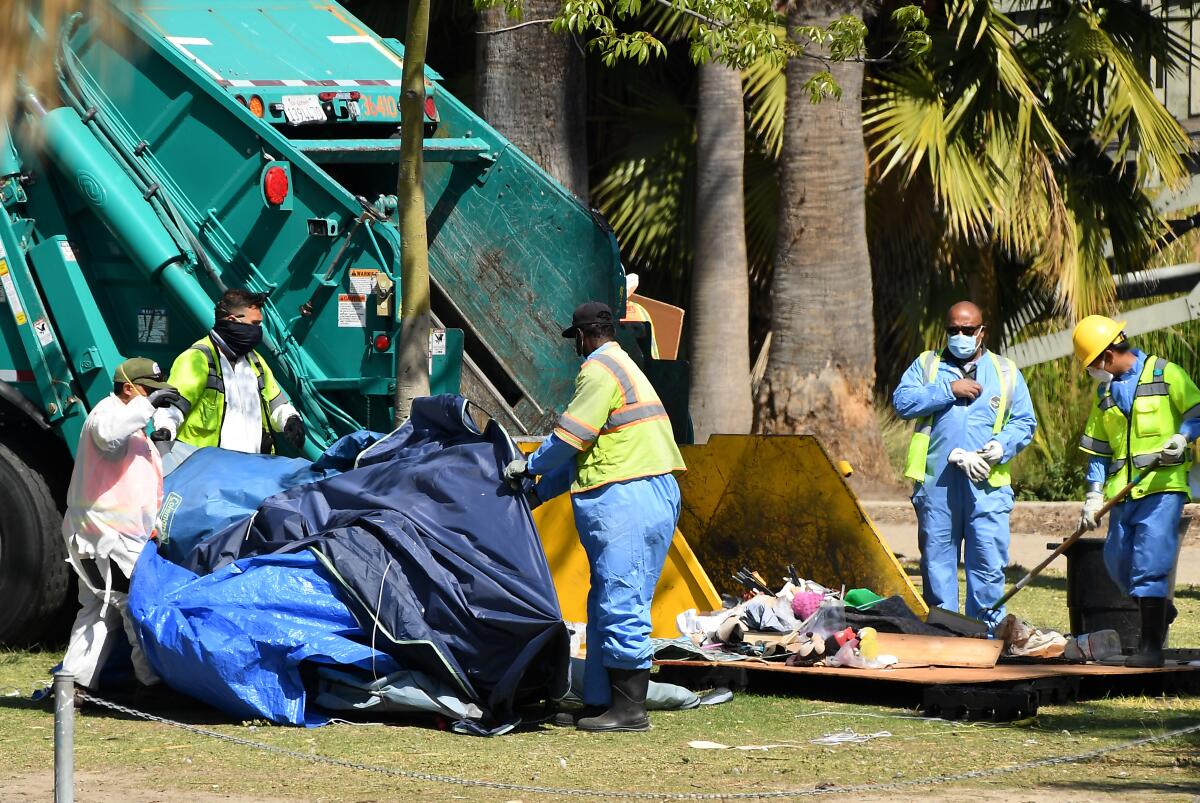
Although Garcetti praised the efforts at Echo Park, he specified that such an approach would work “when we need to do public works improvements or restore parks.” However, “in most places, we’re not going to have that situation,” he said.
Shayla Myers, senior attorney with the Legal Aid Foundation of Los Angeles, said she was worried that “this is not an isolated strategy.” Singling out particular camps, flooding them with “interim resources” to house people temporarily, and then barring people with fences, signs or policing is “incredibly dangerous,” she argued.
Hotel rooms offered through Project Roomkey, for instance, are “an incredibly scarce resource and the city is deploying that resource at the whim of council members — not to the most vulnerable residents,” Myers said. “It’s a strategy to address the visible evidence of homelessness, but it does nothing to solve the crisis.”
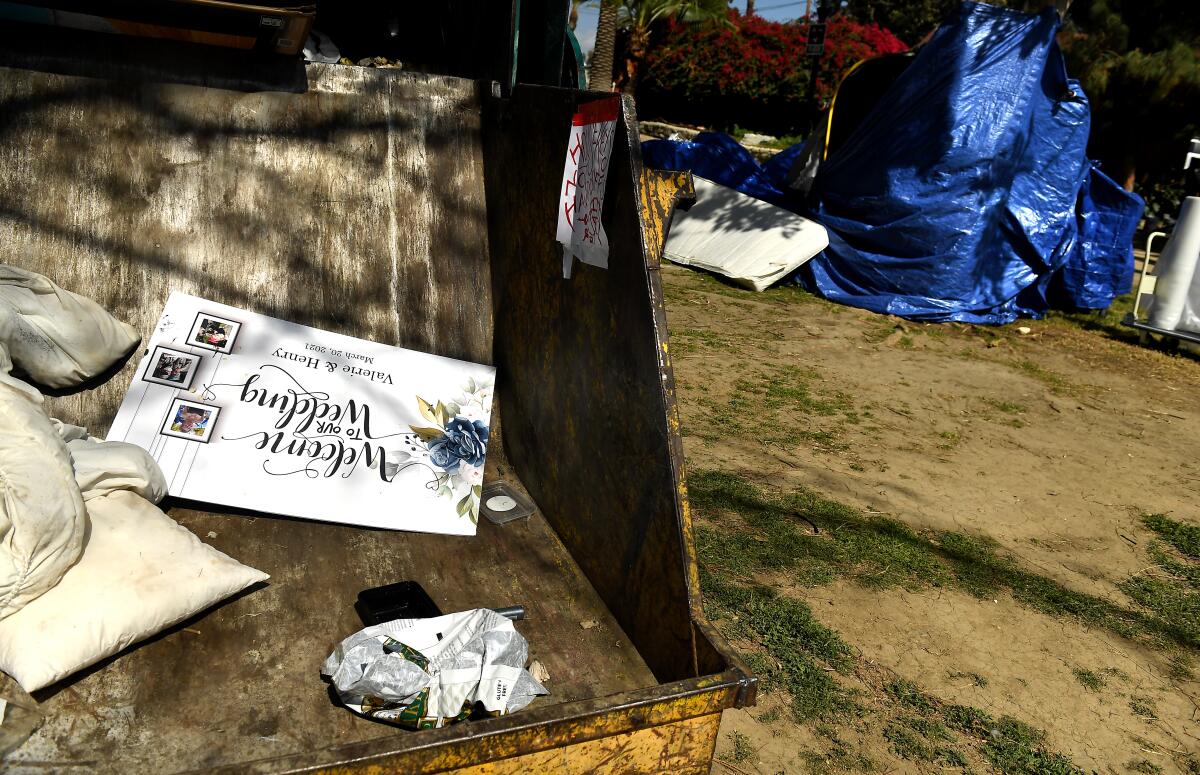
More than a day after the city fenced off Echo Park, the last residents to remain — Ayman Ahmed and David Busch-Lilly — were arrested Friday morning after spending a final night along the lake.
Along Sunset Boulevard, the chaos of recent days seemed to have dissipated. Steps from where police had encircled and arrested protesters along with journalists, the back patio of Stories Books and Cafe was packed with patrons.
A few buildings away, outside the back entrance to O’Farrell’s district office, former park resident Valerie Zeller argued with her new husband, Henry, as he tried to coax her into sorting through the few possessions she had gotten out of the park. The couple had gotten married in the park last weekend.
They met on a cold night, both taking refuge in the waiting room at Union Station, then upgraded to a tent in the homeless camp on the banks of Echo Park Lake.
“If you don’t decide what we should store, we’re gonna have to carry it,” Henry said.
The couple, who had slept Thursday in an alley, were later connected with a room for the night. Outside the fenced park, police were preventing former residents of the encampment from returning to look for their valuables. One woman yelled that she needed to get inside to find her birth certificate.
Beyond the police tape, dozens of sanitation workers in white suits divided the park into zones and mapped out the tents before sorting through them — a fraught process of categorizing what are personal belongings and what is trash or hazardous waste. Things that were deemed to be personal items went into trash bags, which then went into storage boxes, headed for a downtown facility where they could eventually be retrieved.
The crews hoped to finish the job Friday and brought in flood lights so they could work deep into the night. In one of their large yellow dumpsters sat a poster that read: “Welcome to our Wedding. Valerie & Henry. March 20, 2021.”
Staff writer Dakota Smith contributed to this report.
More to Read
Start your day right
Sign up for Essential California for news, features and recommendations from the L.A. Times and beyond in your inbox six days a week.
You may occasionally receive promotional content from the Los Angeles Times.
